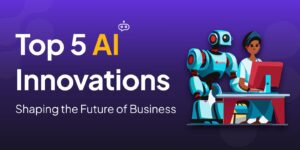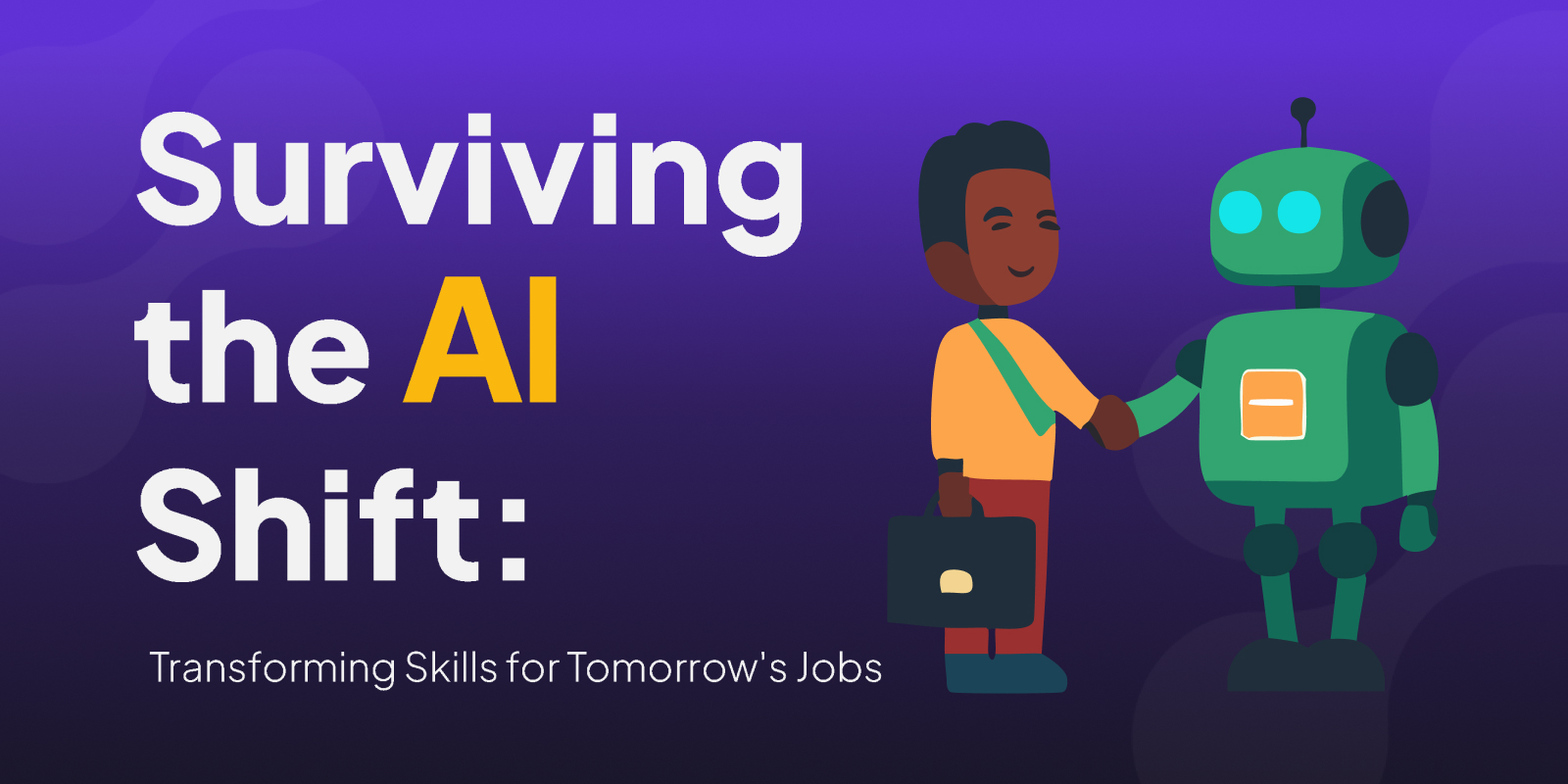Embracing the Change – It’s a familiar headline: “AI is reshaping the future of work.” But instead of viewing this as a threat, what if we saw it as an invitation—an opportunity to evolve alongside the very technology that promises to be the biggest game-changer since the Industrial Revolution? Let’s explore how you can safeguard your career by transforming your skills for tomorrow’s jobs.
Understanding AI and the Job Market
Imagine walking into work tomorrow and your new colleague is, well, a software program. That’s artificial intelligence (AI) in today’s job market – not a robot from a sci-fi movie, but a tool that’s increasingly common in workplaces everywhere.
AI in Action
AI can schedule your meetings, organize your emails, and even predict your next online purchase. It’s revolutionizing industries by handling tasks that humans find tedious. For instance, in healthcare, AI helps radiologists read X-rays more accurately, increasing both the speed and accuracy of diagnoses.
Job Evolution, Not Extinction
The idea isn’t that AI will wipe out jobs indiscriminately, but that it will change them. Consider the role of a bank teller: with the advent of ATMs, tellers now focus more on customer service and complex transactions rather than just cash handling.
Actionable Advice: Stay Informed
A practical step to take right now is to stay informed. Follow tech news in your field to see how AI is being used. If you’re in marketing, for example, you might look into AI that personalizes customer interactions.
Jobs Feeling the Heat
As AI technology becomes an ever-present reality in the workplace, it’s transforming job roles in unexpected ways. Here’s a closer look at professions undergoing this change and the evolving skill sets they demand.
Legal and Paralegal Professions
The legal profession, long steeped in tradition, is now on the cusp of a technological revolution. AI is proving invaluable in conducting due diligence, reviewing contracts, and researching legal precedents, drastically reducing the hours spent on legal legwork. For legal professionals, the new frontier involves leveraging this data to craft more compelling arguments and provide strategic counsel.
Creative Industries
Creative fields are also finding AI to be a double-edged sword. On one hand, AI’s ability to analyze consumer data and generate preliminary design concepts is invaluable. On the other, it challenges professionals to elevate their game: to innovate beyond algorithms and deliver the depth, emotion, and brand storytelling that only humans can.
The Skills That AI Can’t Replace… Yet
While AI is rapidly advancing, there are still many areas where human skills are irreplaceable. Understanding these can help you safeguard your career against the tides of automation.
Inherently Human Traits
AI may excel at processing information and performing routine tasks, but it struggles with the nuances of human emotion and complex interpersonal dynamics. Jobs that rely on deep empathy, like nursing or social work, or those that require nuanced judgment, such as high-stakes negotiation or ethical decision-making, remain firmly in the human domain.
Creative and Strategic Thinking
Creative professions thrive on originality and the unique spark of human ingenuity. While AI can produce art and write articles, it doesn’t truly “create” in the same way humans do—it remixes based on existing data. Similarly, strategic roles that require an understanding of complex, multifaceted issues cannot be easily replicated by AI.
Adapting to Unpredictability
Humans are also adept at handling unpredictable situations and improvising solutions in real time. AI relies on data, so in scenarios where data is lacking or unusual, human experience and intuition are key. Emergency services, for instance, depend on quick, adaptive thinking—a skill AI is far from mastering.
Cultivating These Skills
Focus on enhancing your emotional intelligence, creativity, and strategic thinking abilities. Engage in activities that challenge you to think outside the box, work in team settings that leverage diverse human experiences, and pursue roles that require a personal touch.

Note: Image created using DALL-E
Riding the Wave: AI and Job Creation
The advent of AI isn’t just about the automation of tasks—it’s also opening a floodgate of new career paths and opportunities. Understanding and embracing these new roles can turn the tide from job loss to career revolution.
New Roles Created by AI
AI necessitates new kinds of expertise and job functions that didn’t exist a decade ago. Here are a few:
- AI Trainers: Specialists who teach AI systems how to mimic human behavior.
- AI Maintenance Technicians: Experts who service and repair AI systems.
- Data Curators: Professionals who clean, label, and prepare data for AI processing.
- Ethics Compliance Managers: Individuals responsible for ensuring that AI applications adhere to ethical guidelines.
Enhancing Job Quality
AI can also enrich jobs, making them more engaging and less hazardous. For instance, AI in construction leads to safer work environments by using predictive analytics to assess risks, allowing humans to focus on more strategic and less dangerous tasks.
Facilitating Human Work
AI’s predictive capabilities are transforming roles in sectors like retail, where it can forecast trends and manage inventory, leaving the creative and interpersonal elements to human workers. This symbiosis between human intuition and AI’s analytical prowess is creating jobs that are more fulfilling and intellectually stimulating.
Assessing Your AI Risk and Taking Action
In a landscape where AI’s influence continues to expand, professionals must assess the risk of automation and proactively plan for the future. Here’s how you can evaluate your AI risk and take steps to remain indispensable in your field.
Identifying Vulnerabilities
Start by examining the tasks that make up your job. Are they repetitive, rule-based, and predictable? If so, they’re likely candidates for automation. Tasks that require a high degree of human flexibility, problem-solving, and emotional intelligence are less prone to be taken over by AI.
Taking Proactive Measures
Once you know where the risks lie, you can begin to bulletproof your career by:
- Learning AI Basics: Gain a foundational understanding of AI and how it’s applied in your industry.
- Developing Soft Skills: Strengthen skills like communication, leadership, and empathy.
- Adapting to Change: Be open to change and ready to pivot into roles that AI is creating.
Preparing for Transition
Consider how your skills could transfer to a less vulnerable one if you’re in a high-risk job. For instance, a financial analyst might retrain to specialize in AI financial forecasting.
Building an AI-Proof Skillset
In the face of AI’s growing capabilities, building a skillset that remains in demand, regardless of technological advancements, is essential. Here’s how you can fortify your professional value in the AI age.
Focus on the Uniquely Human
AI excels in tasks with clear rules, but it cannot compete with human creativity, critical thinking, and emotional intelligence. Cultivating these abilities can make you irreplaceable. Engage in complex problem-solving scenarios and seek roles that require a human touch.
Upgrade Your Technical Knowledge
Even if you’re not in a tech-focused role, understanding the basics of AI and machine learning can provide a competitive edge. Consider courses on data literacy, which will help you make informed decisions and understand AI outputs.
Interdisciplinary Learning
The most resilient professionals are those who can bridge gaps between disciplines. Combining your existing expertise with knowledge of AI applications in your field can open up new opportunities and make you a vital part of any professional setting.
Continual Learning and Adaptability
Commit to lifelong learning to stay ahead. As AI changes the landscape, the willingness to adapt and learn new skills will be paramount. Take advantage of online courses, workshops, and other educational resources to keep your skillset fresh and relevant.
Conclusion
The AI shift isn’t a disaster movie scenario—it’s a real-world evolution of the job market. By understanding AI’s role, embracing lifelong learning, and adapting your skill set, you can not only survive but thrive. The future is bright for those who are ready to transform their skills for tomorrow’s jobs.









